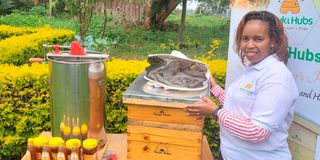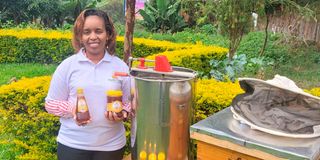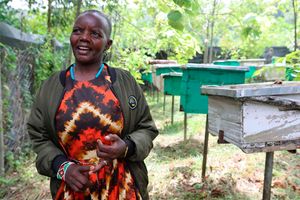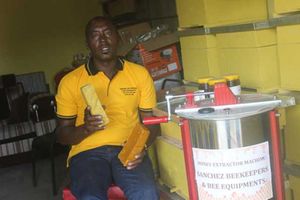
Joyce Kamau, general manager of Nyuki Hubs Kenya Ltd, displays some of the equipment and products that she produces in her firm.
In Kenya’s arid and semi-arid lands (ASALs), the sun scorches the earth, water is scarce, and fields lie fallow. Yet, in this harsh environment, bees hum with life, thriving where most crops cannot.
Their secret? A powerful, often overlooked alliance with the land.
While chemical-heavy agriculture chokes conventional farms, bees here pollinate with precision, fuel biodiversity, and quietly sustain food systems. But their ecosystem is in peril.
Nyuki Hubs Kenya Limited is a game-changing initiative that leverages the power of bees to uplift livelihoods and combat food insecurity.
Through innovative, climate-resilient beekeeping practices, the enterprise protects these vital pollinators while also transforming Kenya’s agricultural landscape for a sustainable future.
Joyce Kamau, general manager of Nyuki Hubs Kenya Ltd, a social enterprise under Christian Aid Kenya, explains that the organisation was established as a livelihood project to empower marginalised communities through apiculture.
Training farmers in modern beekeeping practices ensures consistent honey production while tackling challenges such as poor-quality honey, inadequate equipment, and limited market access.

Joyce Kamau, general manager of Nyuki Hubs Kenya Ltd, displays some of the equipment and products that she produces in her firm.
“We aim to bridge the gap in Kenya’s supply of quality organic honey by helping farmers improve both the quantity and quality of their honey. We operate in counties such as Makueni, Tharaka Nithi, Narok, West Pokot, Taita Taveta, and Baringo, where strategically located hubs ensure consistent production, even though honey harvesting is seasonal,” she says.
The lack of a reliable market for honey led to the creation of Nyuki Hubs, which completes the entire value chain.
“We buy honey directly from farmers, pay them promptly, and find a market for the product,” she adds.
The enterprise produces authentic, organic honey to meet the growing demand from health-conscious consumers. In addition to improving farmers’ financial livelihoods, the company promotes healthier living through better food choices.
However, market access remains a significant barrier for many small-scale producers, who are often exploited by brokers posing as aggregators.
These brokers manipulate prices and exacerbate market failures, undermining the value chain.
Ms Kamau notes that in the honey sector, up to 70 per cent of honey is adulterated by unscrupulous middlemen, harming both producers and consumers.
The enterprise serves as an important link between beekeepers and high-value markets by training farmers in modern techniques such as hive management, harvesting, and post-harvesting practices.
They also supply affordable, high-quality beekeeping equipment, protective gear, and honey extractors. With centralised honey processing centres, Nyuki Hubs ensures consistent quality control, traceability, and compliance with food standards, helping farmers access better markets while promoting sustainable honey production.
“Farmers work hard to produce authentic honey, and consumers work hard to pay for it. We believe that authentic honey should reach consumers, but it requires significant effort at every stage,” she says.
She adds that they train farmers in good apiary practices, provide modern Langstroth hives, offer monthly quality supervision, ensure hygienic harvesting, and establish accessible processing hubs, all while maintaining the highest food safety standards.
Ms Kamau highlights several challenges, including climate change, erratic weather patterns, and deforestation, which severely impact honey production by disrupting flowering cycles and reducing nectar availability, particularly in arid and semi-arid regions.
Prolonged droughts, high temperatures, and water scarcity force bees to abandon hives, weakening colonies and lowering honey yields. Additionally, the use of pesticides in agriculture causes colony collapse and contaminates honey with harmful chemicals.
Beekeepers also face obstacles such as limited market access, competition from adulterated honey, and fluctuating prices. Traditional gender roles restrict participation in beekeeping, especially among women and youth.
To address these issues, Nyuki Hubs supports smallholder farmers by providing training in sustainable beekeeping practices, pest control, and quality standards for honey production.
The organisation also offers training in financial literacy and marketing strategies to help farmers improve their income and ensure honey quality.
“We have trained farmers in modern beekeeping techniques through workshops and hands-on training, covering hive inspection, hygienic honey harvesting, colony management, water harvesting, sustainable practices, and record-keeping, helping them transition from traditional to modern methods,” she says.
Working with over 7,200 farmers, the enterprise provides a reliable market by purchasing honey at competitive prices directly from the hubs. It completes the value chain, ensuring farmers no longer need to worry about income or market access.






